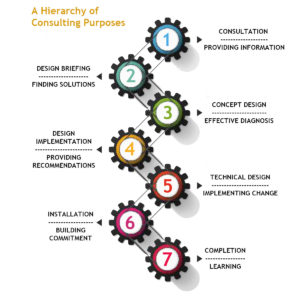What Is a Consultant?
A consultant is a person who can offer professional or expert support, advice and guidance. They take the time to get to know you and the challenges your organization is facing, and then use their understanding and personal experience to help you build your Big Idea.
Consultants are fixers, objective troubleshooters and strategists preventing problems and implementing wanted change. They can often supplement your existing team members with an outside perspective.
A primary reason why organizations hire consultants is that they possess a knowledge advantage. There are other advantages too.
- A seasoned consultant can often devote time and expertise to a project that staff, employees, or volunteers just don’t have.
- External consultants are less susceptible to internal politics or sensitive situations.
- Consultants can easier do the ‘dirty work’, i.e. make the decisions no one internally wants to make.
A consultant is very much like a mentor – a beneficial relationship in which an experienced individual imparts knowledge, expertise and wisdom to a less experienced individual. They provide guidance, motivation, and emotional support in a friendly and supportive environment. Consultants always have your best interests in mind and tailor the relationship to meet the needs of the client.
Through a sequence of stages, they guide you through seven fundamental objectives to bring your Big Idea to life as seen below.

Stage 1. Consultation or Providing Information: A primary reason why organizations hire consultants is that they possess a knowledge advantage. Information is often pursued with the express purpose of solving a known problem. A consultant’s first job is to determine what that problem really is.
Stage 2. Design Briefing or Finding Solutions: Often clients will be tasked with fixing a grainy video feed (lighting problem) or perhaps they want to introduce live events at a coffee house. Maybe a church (or several members) has the desire to bring a creative arts ministry to life. A professional consultant will know what questions to ask so a proper solution can be found.
Stage 3. Concept Design or Effective Diagnosis: Sometimes a consultant is brought in because of an improper diagnosis. Perhaps the existing lights are fine: They only need to be refocused.
You don’t need a new control board: You need to train your ministry team in how to use it.
Maybe your church tried to form a drama ministry and it failed. You don’t need a new leader: You need to learn the proper steps.
Stage 4. Design Implementation or Providing Recommendations: The engagement characteristically concludes with a written report or oral presentation that summarizes what the consultant has learned and that recommends in some detail what the client should do. A consistent, logical action plan of steps is designed to improve the diagnosed problem. The consultant recommends, and the client decides whether and how to implement. Many people say that the purpose of the engagement is then fulfilled.
Stage 5. Technical Design or Implementing Change: A consultant’s role bleeds over to that of a Project Manager, Designer, or General Contractor when asked to help install the recommended system. This announces the second phase in the traditional consulting purpose. Together, the consultant and client will determine which steps the organization is ready to pursue and how to launch further actions.
Sage 6. Installation or Building Commitment: Now is the time to design and conduct the process for establishing momentum to see the project thru. The building process takes time and serious commitment from the entire staff, congregation or employees whether it’s a full lighting install or a new creative arts ministry.
Stage 7. Completion or Learning: It’s not enough to merely enhance your ability to deal with the new systems. Sometimes members of the team or ministry will need to acquire new skills like lighting design, directing, or producing an event. A good consultant will help you learn methods needed to cope with future challenges.
Promoting overall effectiveness is part of each step. Good advisors are practitioners, but their practices are consistent with their beliefs. Select your consultant wisely and expect value from them. As clients learn how to express new needs, good consultants learn how to address them.